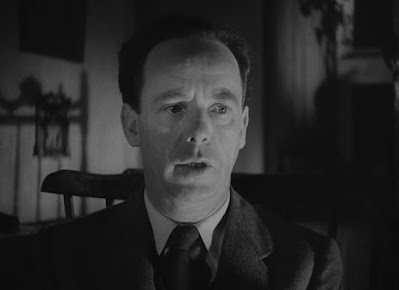TALES FROM THE CRYPT, VAULT OF HORROR... No, the best British portmaneau horror film remains Ealing's 1945 film DEAD OF NIGHT which can still chill.

An architect is invited by a potential client to stay for a weekend. He feels déja vu when he arrives and tells the assembled guests he feels he knows them from his dreams. One by one they recount unsettling incidents that happened to them...

They include a racing driver's strange dream saving him from a deadly accident; a young girl's ghostly encounter during a party game; a woman's gift of a mirror to her fiancée drives him murderously deranged; and two golfing friends extend their rivalry beyond the grave.

But the best remains Michael Redgrave's nightclub venriloquist driven schizophrenic by his doll's persona.

Only after all these are told does the architect realise why it is all familar to him...

Still haunting after 75 years...

Shelf or charity shop? DEAD OF NIGHT resides in the limbo of my plastic storage case - scaring the bejeebus out of the other dvds. Basil Dearden directed the linking story as well as the racing driver sequence, Robert Hamer directed the haunted mirror sequence, Charles Crichton directed the golfer's story (which is the only segment that outstays it's welcome) while Alberto Cavalcanti directed the Christmas party and the ventriloquist sequences. There are memorable contributions from Mervyn Johns as the fearful architect, Miles Malleson as a cherubic harbinger of death, Sally Ann Howes as the pert teenager, Googie Withers as the buyer of the mirror, Frederick Valk as the pragmatic psychiatrist, Elisabeth Welch as the owner of the Chez Beulah cabaret, and above all Michael Redgrave's schizo ventriloquist - his final scene confrontation with Hugo the dummy remains genuinely disturbing.












